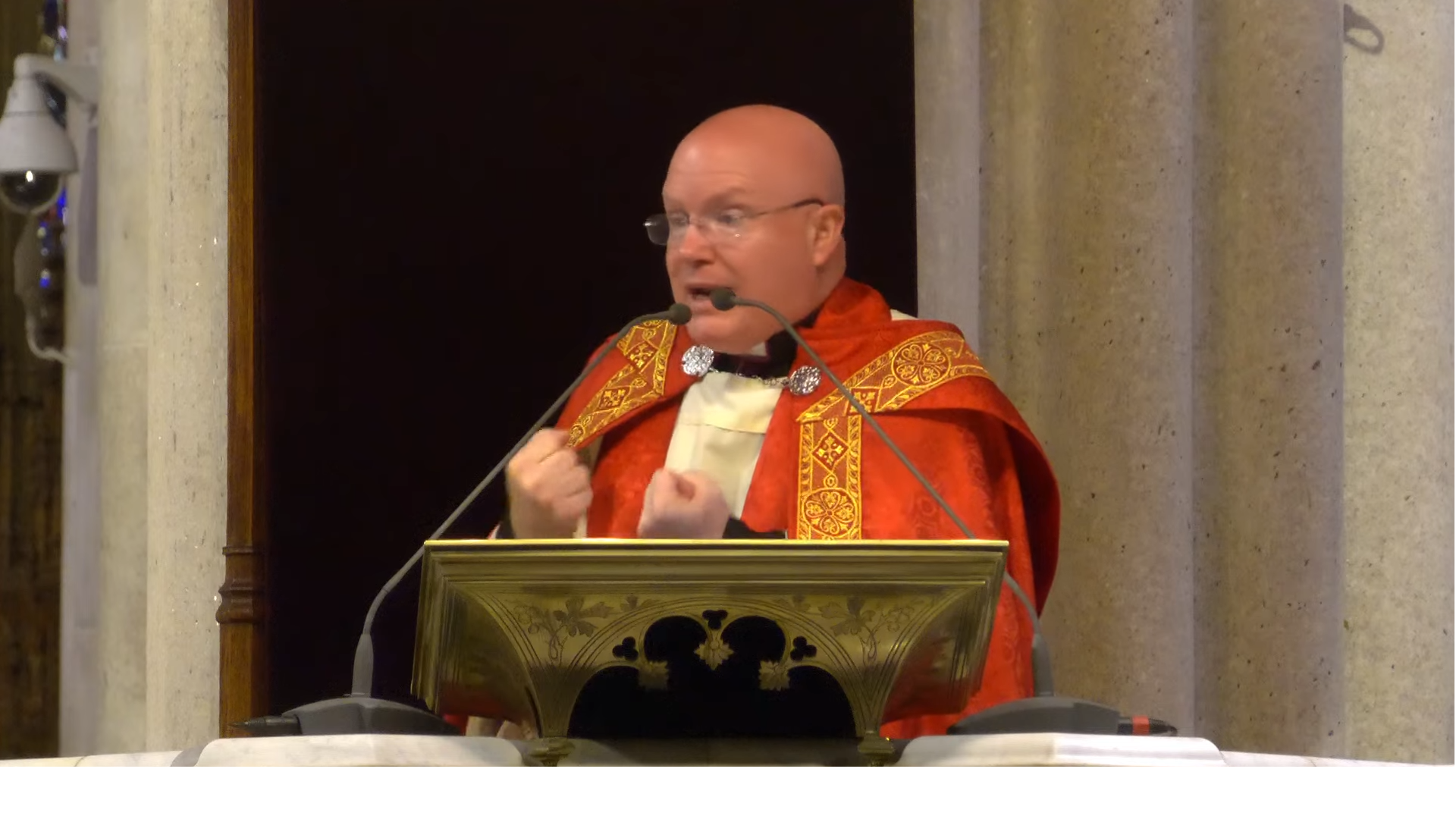
Watch the full meditations here:
NEW YORK — On Good Friday, April 18, 2025, St. Patrick’s Cathedral in New York City held a sacred silence as Msgr. Roger J. Landry, National Director of The Pontifical Mission Societies USA, stepped to the pulpit to proclaim a message of hope from Calvary. At the invitation of Cardinal Timothy Dolan, Msgr. Landry delivered meditations on each of Christ’s Seven Last Words from the Cross.
Framed by the Jubilee Year of Hope, proclaimed by Pope Francis, Msgr. Landry’s reflections bore the weight of centuries of Church wisdom. “The Cross is our only hope,” he declared at the outset, echoing the ancient hymn Vexilla Regis. “It was on the Cross that we see just how much God loved the world.”
What followed was not a homily, but a theological and pastoral pilgrimage. He walked the congregation through the agony, love, and triumph of Christ, not with abstract thoughts, but with the urgency of a man who believes every word he says.
First Word: “Father, forgive them, they know not what they do.”
Msgr. Landry began with the scandal of mercy. As Jesus was being nailed to the Cross, he prayed for his executioners. “Rather than thinking of his torments, he looked with love on his tormentors,” he said.
He quoted Archbishop Fulton Sheen, who noted that most dying men either plead for mercy or proclaim their innocence. Jesus, by contrast, asks for forgiveness for those who show him none. “True love shows itself in mercy,” Msgr. Landry reflected.
He listed saints who embodied this divine love: St. Stephen, who asked God not to hold the sin of his murderers against them; St. Maria Goretti, who forgave her attacker from her deathbed; and St. John Paul II, who visited and forgave the man who tried to assassinate him.
Jesus’ prayer, “Father, forgive them,” he explained, was not limited to Roman soldiers. “He was praying for all sinners. For us. He wanted us to know he was praying for us.”
That prayer, Landry said, is the basis of Christian hope: “Christ on Calvary showed us that in his divine plan, mercy wins. Evil does not have the last word.”
Second Word: “Today you will be with me in paradise.”
“Conversion is possible, even at the last minute,” Msgr. Landry proclaimed. In a moment of extraordinary grace, one of the thieves crucified next to Jesus repents.
“A dying man asked a dying man for eternal life,” he said, quoting Archbishop Sheen. “A man without possessions asked a poor man for a Kingdom. A thief at the door of death asked to die like a thief and steal Paradise.”
Msgr. Landry reminded listeners that this encounter has comforted countless souls: from Blessed Michael McGivney ministering to a condemned man in Connecticut, to saints like Joseph Cafasso who served prisoners and helped them die in peace.
“This is not just the story of Dismas,” he said. “This is a story for anyone who has ever felt they were too late, too lost, too sinful. Jesus says, ‘Today, you will be with me.'”
Third Word: “Woman, behold your son… Behold your mother.”
Turning to the third word, Msgr. Landry said, “Mary was not weeping or fainting. She was standing.”
He described Mary as the Church’s icon of hope, her heart pierced, yet full of faith in God’s promise. “She remembered the angel’s message, that this child would reign forever. And she believed.”
Jesus, in entrusting her to John, made her the mother of all disciples. “He was founding a new family, a family of hope,” said Msgr. Landry.
Drawing from St. John Paul II and St. Josemaría Escrivá, he urged listeners to bring Mary into their lives: “From the Cross, Jesus speaks to each of us, ‘Behold your Mother.'”
Fourth Word: “My God, my God, why have you forsaken me?”
Msgr. Landry paused to let the gravity of this word settle. At first glance, it appears to be despair. But it is, he said, a cry of trust.
“Jesus is quoting Psalm 22,” he explained. “It begins in abandonment but ends in triumph.”
He noted that saints and mystics have clung to this Psalm in their own darkness. “Blessed Chiara Luce Badano said, ‘If you want this, Jesus, then I want it too.'”
Jesus’ words, Landry emphasized, give voice to those in prisons, hospitals, war zones, and lonely apartments. “This is not the cry of despair,” he said. “It is the anthem of hope that survives the dark night.”
Fifth Word: “I thirst.”
In the fifth word, Jesus reveals the thirst of God for humanity.
“Jesus, who turned water into wine, who met the Samaritan woman at the well, who is Living Water Himself, now says, ‘I thirst,'” Landry said.
This thirst is not only physical, but spiritual. “He thirsts for us to receive him, and to quench his thirst in others,” he said. He recalled the life and mission of Mother Teresa, who placed these words next to every crucifix in her convents.
Landry added, “He thirsts for every soul, and he thirsts for us to thirst with him.”
Sixth Word: “It is finished.”
“This was not a sigh of defeat,” Msgr. Landry proclaimed. “It was a shout of victory.”
He unpacked the theological richness of this word: Jesus had fulfilled every prophecy, completed the Passover, and paid the price of our redemption.
The Greek word tetelestai, he explained, means “paid in full.”
He compared it to saints who persevered: St. Paul declaring he had “fought the good fight,” and St. Monica, who prayed for her son Augustine for 30 years.
“The work is done. The debt is paid. The gate is open. This is our hope,” he said.
Seventh Word: “Father, into your hands I commend my spirit.”
In his final word, Jesus entrusts everything to the Father. “It was the exclamation point of a life fully given,” said Msgr. Landry.
He referenced Psalm 31, which Jews prayed before sleep, and which Jesus now prays before death. It is not resignation, but loving surrender.
He quoted Cardinal Justin Rigali: “Preparing for death is the greatest opportunity in our lives.”
“Jesus teaches us how to live and die with hope,” Msgr. Landry said. “Not with clenched fists, but with open hands.”
The Cross as the Sign of Hope
As the cathedral prepared for the veneration of the Cross, Msgr. Landry concluded with the words that framed the entire meditation: “Ave Crux, spes unica — Hail, O Cross, our only hope.”
He pointed to the marble pietà behind the sanctuary, where Mary holds her Son. “She is not only holding his body,” he said. “She is holding our hope.”
In a world wounded by war, division, and despair, Msgr. Landry’s meditations rang out like a call to arms for the faithful: to carry the Cross, to cling to the Cross, and to lift high the Cross.
“Hope is not a concept,” he concluded. “Hope is a person. And that person hung on the Cross, and still bears its scars.”
In that battered wood, in those final words, the Church hears her mission and renews her song: Hail, O Cross, our only hope. Help us to lift high that Cross every day.


